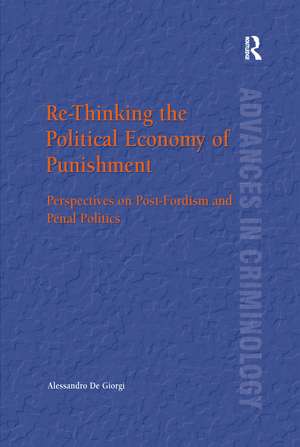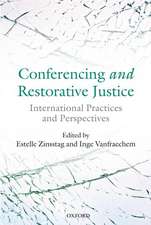Re-Thinking the Political Economy of Punishment: Perspectives on Post-Fordism and Penal Politics: New Advances in Crime and Social Harm
Autor Alessandro De Giorgien Limba Engleză Paperback – 30 noi 2016
| Toate formatele și edițiile | Preț | Express |
|---|---|---|
| Paperback (1) | 312.43 lei 6-8 săpt. | |
| Taylor & Francis – 30 noi 2016 | 312.43 lei 6-8 săpt. | |
| Hardback (1) | 1107.61 lei 6-8 săpt. | |
| Taylor & Francis – 28 mai 2006 | 1107.61 lei 6-8 săpt. |
Din seria New Advances in Crime and Social Harm
-
 Preț: 326.78 lei
Preț: 326.78 lei -
 Preț: 469.34 lei
Preț: 469.34 lei -
 Preț: 389.38 lei
Preț: 389.38 lei - 20%
 Preț: 184.81 lei
Preț: 184.81 lei - 24%
 Preț: 321.21 lei
Preț: 321.21 lei - 31%
 Preț: 767.38 lei
Preț: 767.38 lei - 22%
 Preț: 238.29 lei
Preț: 238.29 lei -
 Preț: 489.26 lei
Preț: 489.26 lei -
 Preț: 489.26 lei
Preț: 489.26 lei -
 Preț: 469.34 lei
Preț: 469.34 lei -
 Preț: 461.66 lei
Preț: 461.66 lei -
 Preț: 469.34 lei
Preț: 469.34 lei - 18%
 Preț: 259.98 lei
Preț: 259.98 lei - 20%
 Preț: 259.98 lei
Preț: 259.98 lei - 20%
 Preț: 259.98 lei
Preț: 259.98 lei - 16%
 Preț: 274.87 lei
Preț: 274.87 lei - 17%
 Preț: 259.98 lei
Preț: 259.98 lei -
 Preț: 379.77 lei
Preț: 379.77 lei -
 Preț: 363.20 lei
Preț: 363.20 lei - 18%
 Preț: 894.39 lei
Preț: 894.39 lei - 18%
 Preț: 1003.30 lei
Preț: 1003.30 lei - 18%
 Preț: 1006.30 lei
Preț: 1006.30 lei
Preț: 312.43 lei
Preț vechi: 364.17 lei
-14% Nou
Puncte Express: 469
Preț estimativ în valută:
59.79€ • 64.92$ • 50.22£
59.79€ • 64.92$ • 50.22£
Carte tipărită la comandă
Livrare economică 22 aprilie-06 mai
Preluare comenzi: 021 569.72.76
Specificații
ISBN-13: 9781138253957
ISBN-10: 1138253952
Pagini: 184
Dimensiuni: 156 x 234 x 14 mm
Greutate: 0.45 kg
Ediția:1
Editura: Taylor & Francis
Colecția Routledge
Seria New Advances in Crime and Social Harm
Locul publicării:Oxford, United Kingdom
ISBN-10: 1138253952
Pagini: 184
Dimensiuni: 156 x 234 x 14 mm
Greutate: 0.45 kg
Ediția:1
Editura: Taylor & Francis
Colecția Routledge
Seria New Advances in Crime and Social Harm
Locul publicării:Oxford, United Kingdom
Cuprins
Contents: Introduction; The political economy of penality and the sociology of punishment - past and present; Post-Fordism and the emergence of the multitude; The government of surplus - preliminary incursions in the field of post-Fordist social control; Mass confinement and actuarial penology; The criminalization of international migrations - toward an actuarial model of control; Conclusion; Bibliography; Index.
Notă biografică
Alessandro De Giorgi has a PhD in Criminology from Keele University, UK. He is a researcher in Criminology in the Faculty of Law at the University of Bologna, Italy. His main research interests are in global migrations and the political economy of social control in contemporary societies.
Recenzii
'With Re-thinking the Political Economy of Punishment, Alessandro De Giorgi has been the first to update and complete the 1970s revisionist literature of punishment and social control - from Rusche and Kirchheimer to Foucault - for the age of postfordism and imperial globalization!' Dario Melossi, University of Bologna, Italy 'In this strikingly original work, Alessandro De Giorgi revitalizes the tradition of scholarship in the political economy of punishment for our new, but no less troubled, times. In re-examining the boundaries and exclusions where "post-disciplinary control" is exercised, De Giorgi offers both a powerful new analysis and a timely warning.' Richard Sparks, University of Edinburgh, UK 'In this remarkable work, De Giorgi takes the daunting task of sorting out decades of writings on the political economy and convincingly situates them into a coherent framework explaining punishment in a post-Fordist world...With an eye for good format, the author provides an exhaustive review of literature on the political economy while extracting new insights that can be applied to recent shifts in punishment and institutional corrections.' British Society of Criminology '...this book is a significant contribution to the political economy of punishment. De Giorgi has done scholars working within the sociology of punishment a great service in tracing the lineage of this perspective and carrying it beyond the 1970s to the present. Hopefully, others choosing to follow the path he has cleared will apply the same energy and enthusiasm with which he embraces this theoretical perspecitve to addressing some of its limitations.' Theoretical Criminology
Descriere
Examining the political economy of punishment, this book debates the view that the evolution of punitive systems should be connected to the transformations of capitalist economies. The author investigates the emergence of a new flexible labour force in contemporary Western societies and the role of penal politics in controlling this labour force.









